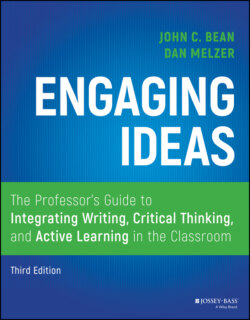Читать книгу Engaging Ideas - John C. Bean - Страница 78
Teaching Genre in the Context of Discourse Communities
ОглавлениеWhen instructors assign a genre, such as an experimental report or a recommendation memo, they have a tacit understanding of how that genre connects to and does the work of the discipline or profession. A psychologist implicitly understands how the structure of an APA experimental report reflects the scientific method and how its frequent use of the passive voice can be explained by scientists' emphasis on the data and not on the individuals conducting the experiment. The psychology professor also knows why the APA citation system, which privileges date of publication over the author's name, differs from the MLA citation system that students might have learned in a composition course. But this tacit knowledge of the connections between genres and discourse community norms is something that students understandably struggle to understand.
The concept of “discourse community” can at first be puzzling to students. Whereas some communities may be identified by ethnicity (the Latinx community), by national origin (the Somalian community), or by gender identity (the trans community), discourse communities are identified by common interests (the steampunk community, the football geek community, or the gamer community). Discourse communities share a common language for discussing their shared interests, including distinctive genres and specialized vocabulary and slang. Students need to learn that each academic discipline forms its own discourse community with its own characteristic ways of using language.
As the research in writing across the curriculum has shown, when students move from one discourse community to another they feel like “strangers in a strange land” (McCarthy, 1987). Students may not understand why a literature review in a philosophy course differs in style and organization from a literature review in a biology course or why different disciplines develop different citation styles. Expert writers understand the ways that genres shape, and are shaped by, discourse communities. To use our own writing as an example, both of us (John and Dan) understand that when we submit an article for publication in a pedagogical journal, the manuscript must meet the targeted journal's expectations for content, structure, and style. These expectations will vary, sometimes substantially, depending on whether the targeted journal is within our own field of writing studies (College English, WAC Journal), is a pedagogical journal in another discipline (Journal of Economic Education, Teaching Psychology), or is in the broad field of education and pedagogy (AAHE Bulletin, Journal of Higher Education). We must consider our target discourse community at every step in our composing processes.
A useful way of thinking about discourse communities comes from the work of the linguist John Swales. Swales (1990) argues that a discourse community has the following characteristics:
A discourse community has a broadly agreed set of common public goals. (24)
A discourse community has mechanisms of intercommunication among its members. (25)
A discourse community uses its participatory mechanisms primarily to provide information and feedback. (26)
A discourse community utilizes and hence possesses one or more genres in the communicative furtherance of its aims. (26)
In addition to owning genres, a discourse community has acquired some specific lexis. (26)
A discourse community has a threshold level of members with a suitable degree of relevant content and discoursal experience. (27)
Students may sometimes view teachers' writing expectations as idiosyncratic, but often what appears as idiosyncratic is in actuality our attempt to represent to apprentice students the discourse community values and expectations of our disciplines. Asking students to write in authentic disciplinary, professional, or public genres provides an opportunity for teachers to encourage students to see writing in college not as merely meeting the requirements of a teacher's assignment prompt but rather as learning to become a member of a discourse community. The importance of teaching students the concept of discourse community is highlighted by WAC scholars Brian Hendrickson and Genevieve Garcia de Muller (2016), who encourage teachers to help students learn the discourse community conventions of new academic literacies. They recommend asking students to reflect on their prior, nonacademic literacies and to think about the ways they may need to reposition themselves culturally to succeed in academic discourse communities.
